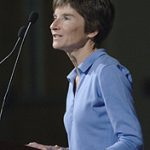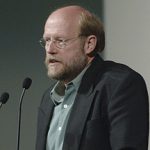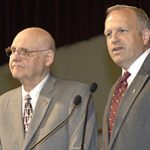Jean Schwind, David Copeland and Richard McBride received top honors at Elon's annual faculty-staff awards luncheon, held Wednesday, May 10 in Koury Center. Details...
 Jean Schwind, associate professor of English, was presented with the 2005-06 Daniels-Danieley Award for Excellence in Teaching at Elon’s annual Faculty-Staff Awards Luncheon on May 10. David Copeland, A.J. Fletcher Professor of Communications, was the recipient of the Distinguished Scholar Award, while University Chaplain Richard McBride received the Periclean Award for Civic Engagement and Social Responsibility.
Jean Schwind, associate professor of English, was presented with the 2005-06 Daniels-Danieley Award for Excellence in Teaching at Elon’s annual Faculty-Staff Awards Luncheon on May 10. David Copeland, A.J. Fletcher Professor of Communications, was the recipient of the Distinguished Scholar Award, while University Chaplain Richard McBride received the Periclean Award for Civic Engagement and Social Responsibility.
Schwind is the 34th winner of the Daniels-Danieley Award, established by President Emeritus J. Earl Danieley ’46 and his wife, Verona Daniels Danieley ’49, in honor of their parents.
Schwind has been praised by colleagues for her devotion to teaching and her dedication to finding new and creative ways to present the subject matter. “Jean works hard at becoming an excellent teacher,” one colleague writes. “She takes both the art and the craft of teaching seriously. I love how she sets extremely demanding academic goals, then shows her students the paths that will lead there. This high level teaching ability reflects Jean’s commitment to demanding more of herself as a teacher and person.”
Students take her classes because of her high expectations and teaching skill, says another colleague, noting that her American Adolescence course has become one of the most popular on campus. “The fact that so many students want to confront challenging readings, movies, and perspectives…when easier courses are available, speaks volumes about the work Jean has done to use this course as a vehicle for changing the lives of our students. She does not teach things; she teaches people.”
Another colleague says Schwind’s “preparation for each and every class puts most of us to shame. She challenges students in ways that are worth seeing, even for those of us who have been in this profession for years. I always learn from her at workshops and retreats or when visiting her classes.”
Students praise Schwind for encouraging them to constantly ask questions and contribute to classroom discussions. “Instead of simply bludgeoning us with her perspective, she was really interested in how we say things,” writes a student. “I got the feeling that she was learning along with us….I’ve had a lot of teachers over the course of my academic career, ranging in quality from poor to excellent. I don’t think I’ve ever had a teacher who cared about what I thought as much as Dr. Schwind did.”
Another student says Schwind has a unique ability to encourage classroom discussion on sensitive topics. “In her classroom, everyone is an active participant. Dr. Schwind guides and counsels without intervening or judging. She is brutally honest, unafraid to give constructive criticism or speak the truth about sometimes sensitive subjects.”
Schwind has served on numerous faculty committees at Elon. She chaired the Academic Council in 2001-2002 and served as co-chair of the Professional Boundaries policy revision committee in 2001. She has also served on the Faculty Athletics Committee and the Ad Hoc Committee on the Evaluation of Teaching. She has written for several publications and presented papers at numerous professional meetings.
 Copeland has earned respect for the quality of his scholarship work and his proficiency as a teacher. Since coming to Elon in 2001, he has published six books, with two more in press. He has written numerous book chapters and served as editor for several highly-acclaimed publications. Copeland was series editor for the 8-volume “Greenwood Library of American War Reporting,” in 2005 and “Debating Historical Issues in Newspapers of the Time,” in 2003. Currently, Copeland is serving as editor of a series of media history books by Peter Lang Publishers and as chief editor of the Thomson Gale 19th-Century Newspaper Digitization Project.
Copeland has earned respect for the quality of his scholarship work and his proficiency as a teacher. Since coming to Elon in 2001, he has published six books, with two more in press. He has written numerous book chapters and served as editor for several highly-acclaimed publications. Copeland was series editor for the 8-volume “Greenwood Library of American War Reporting,” in 2005 and “Debating Historical Issues in Newspapers of the Time,” in 2003. Currently, Copeland is serving as editor of a series of media history books by Peter Lang Publishers and as chief editor of the Thomson Gale 19th-Century Newspaper Digitization Project.
Copeland has also written numerous book chapters and research papers and he is a frequent panelist and lecturer at professional meetings and symposia.
“I believe Professor Copeland’s scholarship deserves a place on a very small bookshelf containing the work of researchers who have helped us understand, indeed defined, important historical aspects of America’s intellectual development,” says a colleague. “His efforts have clearly made an enduring contribution to the larger corpus of historical and journalistic scholarship.”
Copeland is also active in his profession, serving on the editorial board of Journalism History. He has also served on the board of the American Journalism Historians Association and served as the organization’s president in 2000-2001. At Elon he has chaired the Evaluation of Teaching subcommittee and the Teacher-Scholar committee and served as a member of the Academic Council and the Curriculum Revision committee in the School of Communications.
Colleagues say Copeland is a thoughtful colleague who passes on his love of scholarship and research to his students.
“David offers a nurturing atmosphere for junior colleagues and students,” writes a peer. “He works tirelessly with students on their own research projects. This fall, his senior seminar students learned a love for research and scholarship, and some of them produced graduate level work.”
Copeland is the seventh recipient of the Distinguished Scholar Award, established in 2000 to recognize a faculty member whose research has earned peer commendation and respect and who has made a significant contribution to his or her field of study.
 McBride has consistently reached out to the campus and local community since coming to Elon in 1984. He was instrumental in establishing Elon’s Habitat for Humanity chapter and has served as its adviser since 1988. He has encouraged students to take responsibility for raising $30,000 annually to fund new Habitat houses in the local community. He began a Winter Term course that takes students to Guatemala to work with Habitat projects there, and he has accompanied the Elon softball team on a Habitat work trip to Florida.
McBride has consistently reached out to the campus and local community since coming to Elon in 1984. He was instrumental in establishing Elon’s Habitat for Humanity chapter and has served as its adviser since 1988. He has encouraged students to take responsibility for raising $30,000 annually to fund new Habitat houses in the local community. He began a Winter Term course that takes students to Guatemala to work with Habitat projects there, and he has accompanied the Elon softball team on a Habitat work trip to Florida.
McBride also created Elon Volunteers!, which has become the Kernodle Center for Service Learning.
A colleague says McBride’s concern for others is genuine.
“It is a joy to watch him care for people in a way that is never charity. He works ‘with’ people and not ‘for’ them or ‘to’ them. It is clear that his belief in service is not just a role in an organization, it is a personal passion.”
McBride has launched numerous campus programs that benefit students. He was active in the establishment of Senior Showcase, which highlights the talents of graduating students, and Hometown Heroes, a program that allows freshmen to recognize someone who made a difference in their lives or in the community. McBride also launched another Elon tradition, the Turning 21 Dinner, giving students the chance to honor an important mentor in their lives as they reach age 21. In 2004, McBride wrote a book, titled “Inventing A Life, The Journey Through College And Beyond,” about the changes students experience during college.
McBride has also served the local community through his work with the Alamance County Community Services Agency (ACCSA), where he serves as board chairman. He was responsible for the recent search for a new ACCSA director.
“His commitment to his work is incredible,” writes a colleague. “It would be hard to quantify the hours that he gives to projects like Habitat for Humanity, the local counseling organization, a student in need, a person who needs a hand up. When he is needed, he is there.”
McBride is the fourth recipient of The Periclean Award, presented each year to a member of Elon’s faculty or staff whose service to the broader community exemplifies the ideals of Project Pericles.
 President Leo M. Lambert offered a special tribute to President Emeritus J. Earl Danieley, who is completing his 60th year of service to Elon this spring. Lambert presented Danieley with a Waterford crystal Elon Phoenix to mark the occasion and express the university’s gratitude for his service. Danieley, a 1946 Elon alumnus, served as president from 1957 to 1973 and continues to teach chemistry.
President Leo M. Lambert offered a special tribute to President Emeritus J. Earl Danieley, who is completing his 60th year of service to Elon this spring. Lambert presented Danieley with a Waterford crystal Elon Phoenix to mark the occasion and express the university’s gratitude for his service. Danieley, a 1946 Elon alumnus, served as president from 1957 to 1973 and continues to teach chemistry.
Also recognized at the luncheon were staff members who have at least 25 years of service at Elon, and retiring employees Lou Harper, Ken Paul, Larry Simon, John Sullivan and Alan White.


